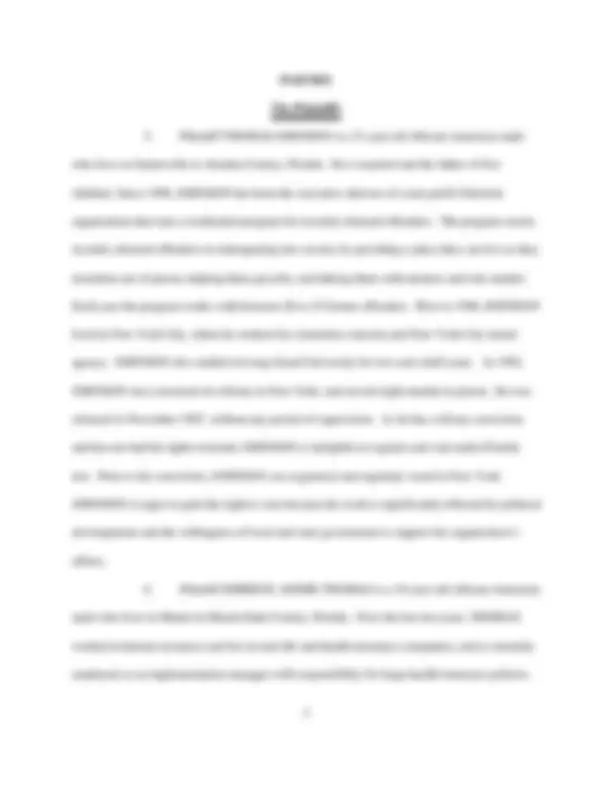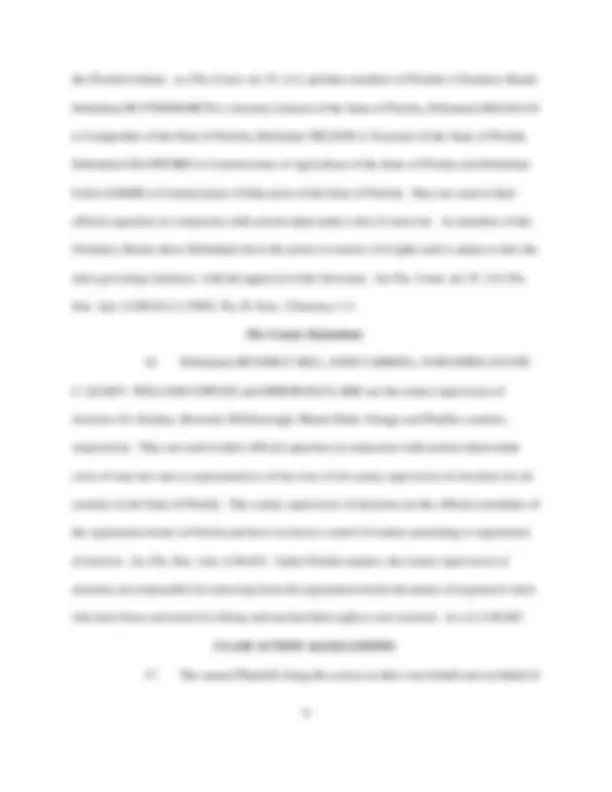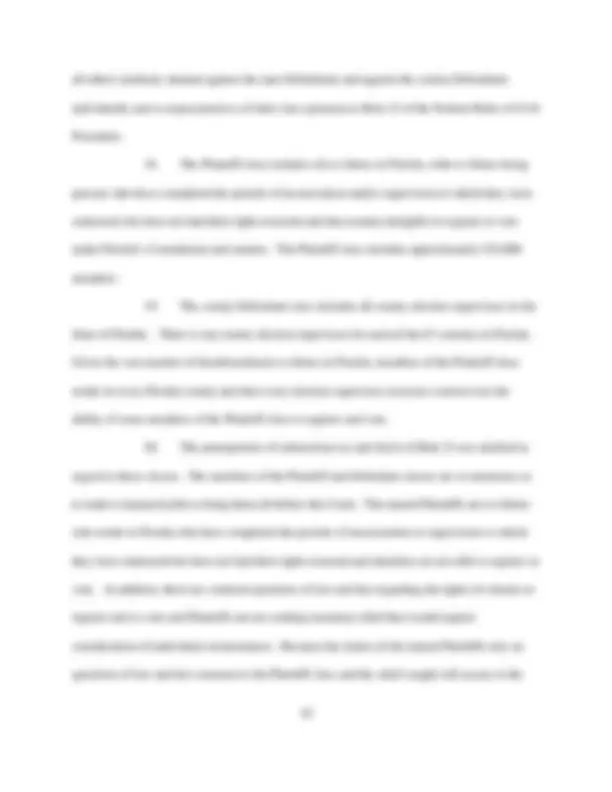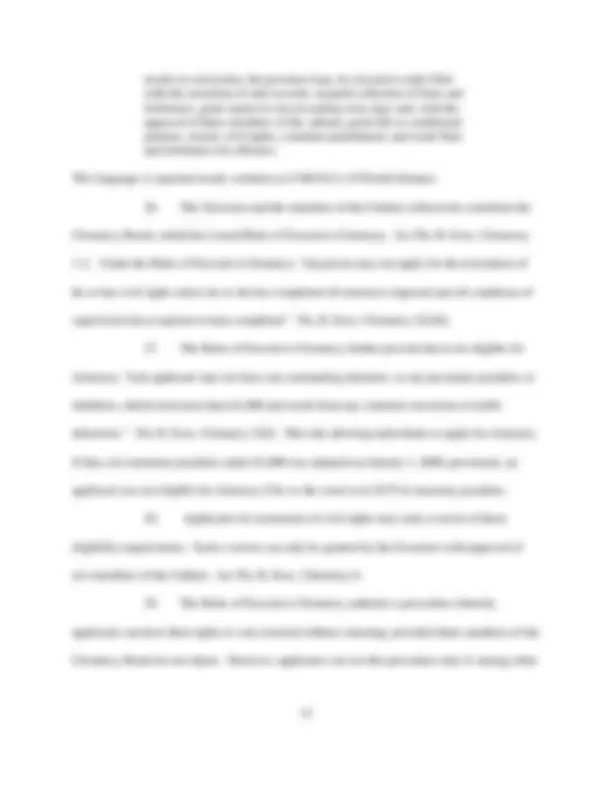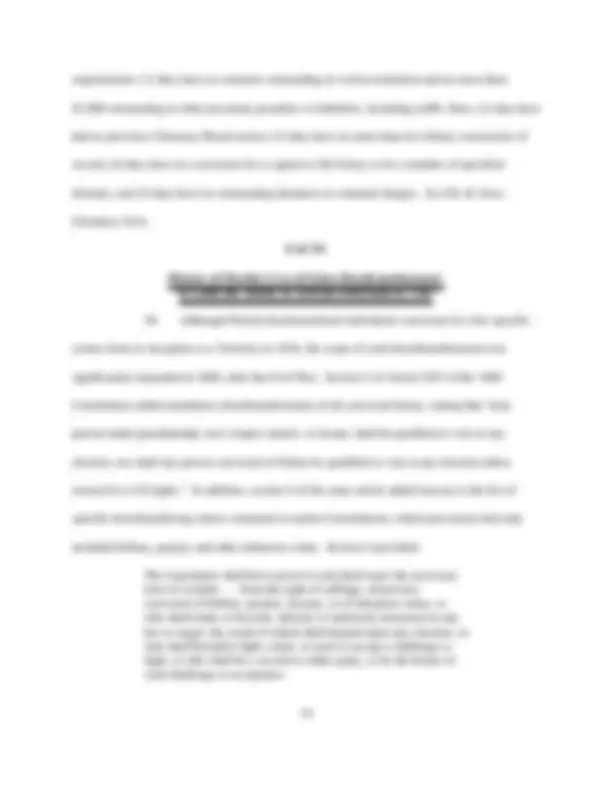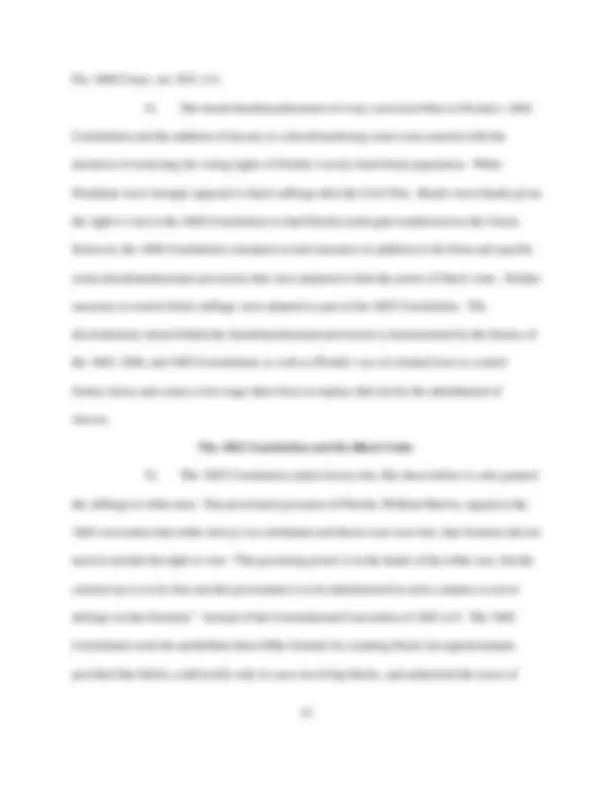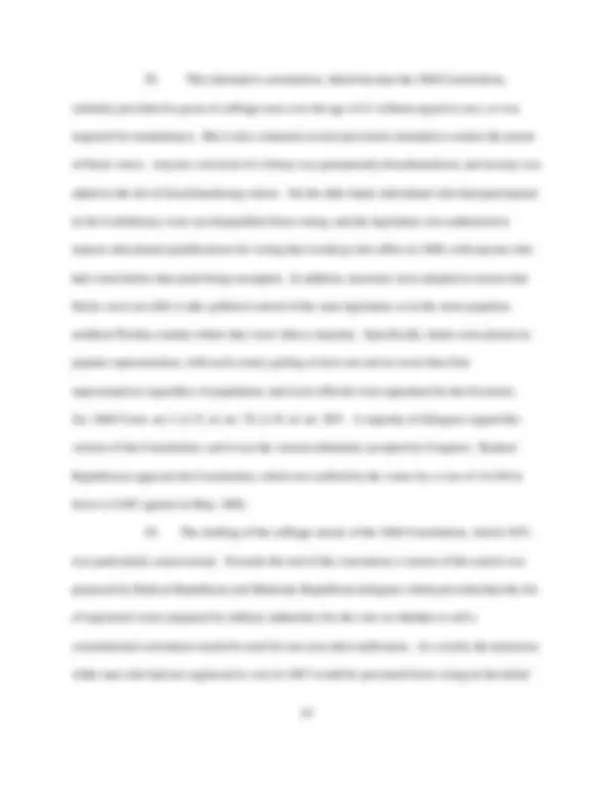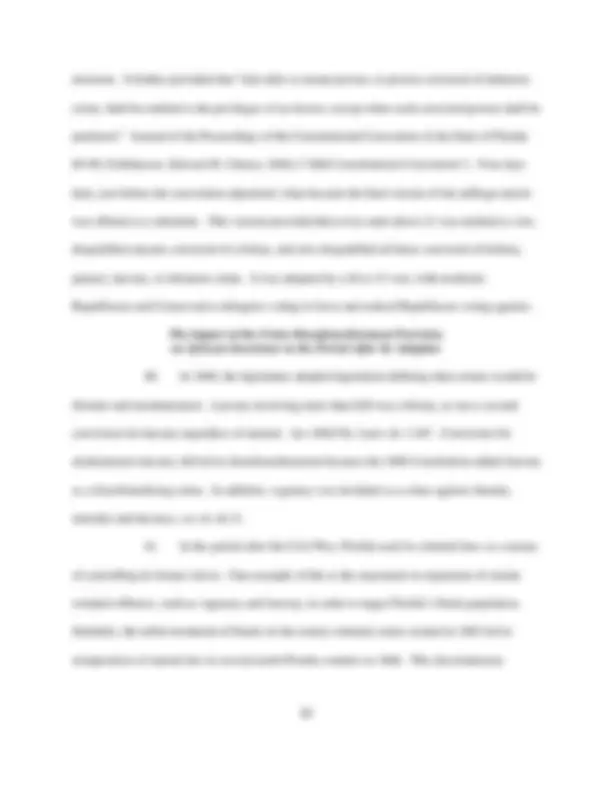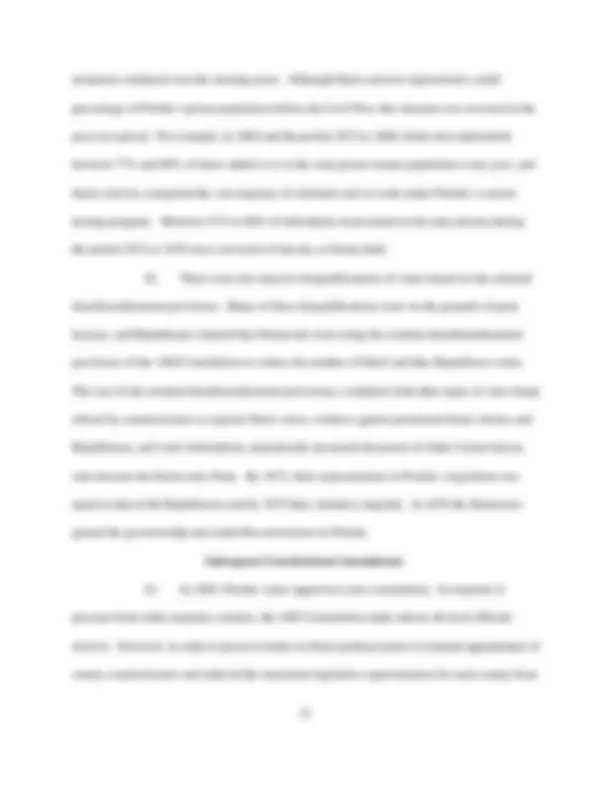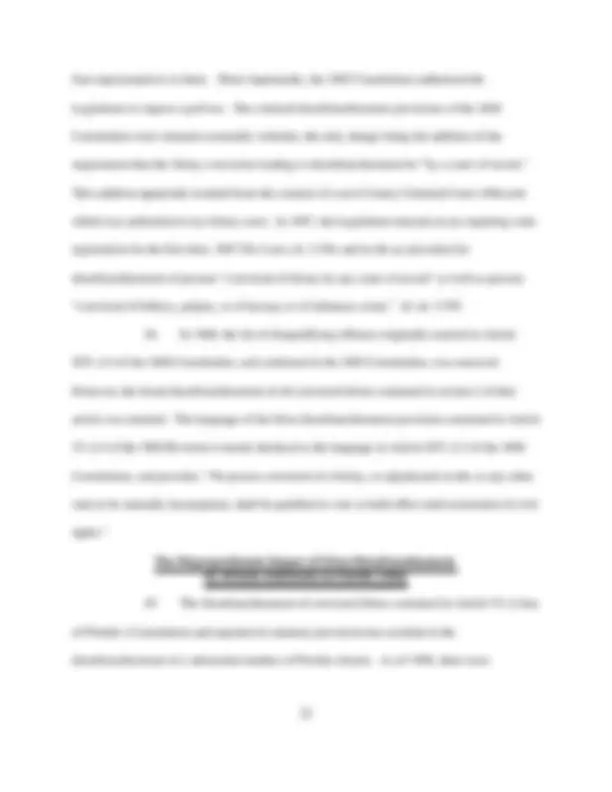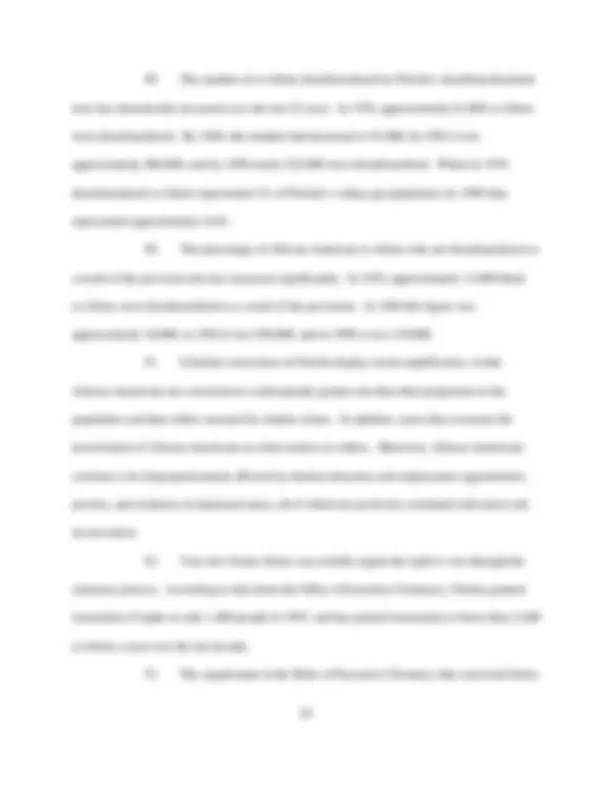Download Florida's Permanent Disenfranchisement of Ex-Felons: A Discriminatory Practice and more Exams Criminal Justice in PDF only on Docsity!
UNITED STATES DISTRICT COURT
SOUTHERN DISTRICT OF FLORIDA
Case No. ____ – Civ. – Judge _______ ---------------------------------------------------------------------x THOMAS JOHNSON; DERRICK ANDRE THOMAS; ERIC ROBINSON; OMALI YESHITELA; ADAM HERNANDEZ; KATHRYN WILLIAMS-CARPENTER; JAU’DOHN HICKS; and JOHN HANES in their own right and as representatives of all ex-felon citizens of Florida, Plaintiffs, v. JEB BUSH, Governor of Florida; KATHERINE HARRIS, Secretary of State of Florida; ROBERT BUTTERWORTH, ROBERT MILLIGAN, WILLIAM NELSON, ROBERT CRAWFORD, and THOMAS GALLAGHER in their roles as members of the Clemency Board of Florida; BEVERLY HILL, Alachua County Election Supervisor, JANE CARROLL, Broward County Election Supervisor, PAM IORIO, Hillsborough County Election Supervisor, DAVID C. LEAHY, Miami-Dade County Election Supervisor, WILLIAM COWLES, Orange County Election Supervisor, and DEBORAH CLARK, Pinellas County Election Supervisor, in their official capacities and as representatives of all county supervisors of election in Florida, Defendants.
COMPLAINT - CLASS ACTION
--------------------------------------------------------------------x
PRELIMINARY STATEMENT
- This action is brought by Plaintiffs on behalf of all Florida citizens who have been convicted of felonies and fully completed the periods of incarceration and/or
supervision to which they were sentenced (“ex-felons”), but nonetheless remain ineligible to register or vote because a felony conviction results in permanent disenfranchisement under Florida’s Constitution and statutes. The permanent disenfranchisement of felons in Florida was initially adopted to discriminate against African-American voters and continues to have a significant discriminatory impact. In 1998, ex-felons disenfranchised under these provisions represented approximately 15% of the African-American male voting age population in Florida. Moreover, although convicted felons can apply to Florida’s Clemency Board for restoration of the right to vote, many ex-felons are denied restoration or are not eligible for restoration because they owe monetary penalties. Plaintiffs contend that Florida’s disenfranchisement and clemency provisions violate the First, Fourteenth, Fifteenth and Twenty-Fourth Amendments of the United States Constitution, Sections 2 and 10 of the Voting Rights Act of 1965, codified at 42 U.S.C. § 1973 et seq ., and 42 U.S.C. § 1983. JURISDICTION
- This court has jurisdiction pursuant to 28 U.S.C. §§ 1331 and 1343; 42 U.S.C. §§ 1973h and 1983; and the First, Fourteenth, Fifteenth, and Twenty-Fourth Amendments to the United States Constitution.
- Plaintiffs’ action for declaratory and injunctive relief is authorized by 28 U.S.C. §§ 2201 and 2202; and by Rules 57 and 65 of the Federal Rules of Civil Procedure. VENUE
- Venue is proper pursuant to 28 U.S.C. § 1391(b) because Defendants CARROLL and LEAHY reside in this district and the state Defendants may be found in this district.
A high school graduate, THOMAS attended college for three years prior to his employment in insurance. In 1990, THOMAS was convicted of two felonies, one under federal law and one under state law. He was sentenced to probation on the federal convictions and ten months imprisonment on his Florida state conviction. In 1999, THOMAS applied for restoration of his civil rights. The Florida Office of Executive Clemency returned his application because $225 in penalties remain outstanding. As a convicted felon who has not had his rights restored, THOMAS is ineligible to register and vote under Florida law. THOMAS is eager to gain his right to vote so that he can become an active citizen in society.
- Plaintiff ERIC ROBINSON is a 30 year old African-American male who lives in Miramar in Broward County, Florida. A high school graduate, ROBINSON has worked as a truck driver since 1996, when he attended a training program and obtained his commercial driver’s license. Previously, he worked in maintenance for six years. ROBINSON is an active member of the 93rd Community Church in Miami and the father of three children. In 1989, he was convicted of a felony in Florida and sentenced to four years’ probation. In 1997, he was convicted of two felonies and served six months’ work release, which he completed on June 25,
- ROBINSON has not had his rights restored and therefore is ineligible to register and vote under Florida law. ROBINSON applied for restoration of his civil rights in September 1999. In October 1999, he was informed that he had $623 outstanding in pecuniary penalties, which made him ineligible for clemency. As a result, his application for restoration of rights was returned. ROBINSON is eager to be able to vote and participate in the political life of his community.
- Plaintiff OMALI YESHITALA (born as Joseph Waller, Jr.) is a 48 year old African-American male who lives in St. Petersburg in Pinellas County, Florida.
YESHITELA lives with his wife and two sons. Since 1972, YESHITELA has been chairman of the National African Peoples Socialist Party, known in Florida as the Uhura Movement. YESHITELA’s felony conviction dates back nearly thirty-five years and arose out of an act of political protest in 1966 in which he removed a canvas mural caricaturing African-Americans from the St. Petersburg City Hall. YESHITELA was convicted of a felony and served 30 months in prison. As a convicted felon who has not had his rights restored, YESHITELA is ineligible to register and vote under Florida law. In December 1998, YESHITELA applied for a pardon for his convictions, and, in 2000, he filed a separate application for restoration of his civil rights. Both applications are pending and no hearings have been held. YESHITELA is eager to be able to vote as an additional avenue through which to push for political reform.
- Plaintiff ADAM HERNANDEZ is a 50 year old Latino male who lives in Opa Locka in Miami-Dade County, Florida. HERNANDEZ became a naturalized United States citizen in 1971, at which time he enlisted in the United States Army. Until 1991, when he suffered a work-related incident, HERNANDEZ worked as an electrician and a jewelry salesman. He has been disabled and unable to work since that time. In 1985, HERNANDEZ was convicted of two felonies in federal court in Missouri and served four years in prison. He successfully completed probation in 1996. As a convicted felon who has not had his rights restored, HERNANDEZ is ineligible to register and vote under Florida law. HERNANDEZ is eager to be able to vote so that he can have a say in his local government.
- Plaintiff KATHRYN WILLIAMS-CARPENTER is a 44 year old African- American female who lives in Miami in Miami-Dade County, Florida. From 1978 to 1994, WILLIAMS-CARPENTER worked in Miami, including as a cashier, telemarketer, and factory
felon who has not had his rights restored, HICKS is ineligible to register and vote under Florida law. HICKS desires to vote so that he can take part in the political process.
- Plaintiff JOHN HANES is a 48 year old white male who lives in Tampa in Hillsborough County, Florida. Since 1996, HANES has worked as a sentencing guidelines consultant, investigating factual issues and guidelines questions for criminal defense lawyers. From 1979 to 1989, HANES worked as a sales representative for tour companies in several states, eventually owning and operating a travel agency in Tampa from 1985 to 1989. HANES was convicted on two connected felonies under federal law, one in 1989 and the other in 1990, and served seven years in prison. He was released in May 1996 and successfully satisfied his term of supervised release in January 1997. HANES lives with and takes care of his mother, who is a diabetic. He is an active member of the Tampa chapter of a national organization, Families Against Mandatory Minimums (FAMM), which lobbies politically on criminal sentencing issues. HANES has not had his rights restored and therefore is ineligible to register and vote under Florida law. He applied for restoration of his civil rights in the spring of 1999, and was informed in July 1999 that the Clemency Board objected to his being granted restoration of his civil rights without a hearing, as authorized under Fla. R. Exec. Clemency 9(A). Prior to his conviction, HANES was a registered voter and voted regularly. HANES is eager to be able to vote and participate in the political process again. The Defendants The State Defendants
- Defendant JEB BUSH is Governor of the State of Florida. He is sued in his official capacity in connection with actions taken under color of state law. As Governor,
Defendant BUSH has the duty to support the Constitution and laws of the State of Florida, including those provisions disenfranchising felons, and to take care that these laws are faithfully executed. See Fla. Const. art. IV, § 1. In addition, Florida’s Constitution places the clemency power in the control of the Governor, and Defendant BUSH’s approval is required in order for a convicted felon to have his or her civil rights restored or for the Clemency Board to adopt or alter rules governing clemency. See id. art. IV, § 8; Fla. Stat. Ann. § 940.01(1) (1999); Fla. R. Exec. Clemency 1-2 (Fla. Clemency Bd., eff. 1/1/2000).
- Defendant KATHERINE HARRIS is the Secretary of State of Florida. She is sued in her official capacity in connection with actions taken under color of state law. As Secretary of State, Defendant HARRIS is the chief election officer of the State of Florida and has responsibility for general supervision and administration of the election laws, including those provisions disenfranchising felons. See Fla. Stat. Ann. §§ 15.13, 97.012. In addition, as Secretary of State she is in charge of the Division of Elections of Florida’s Department of State, which is responsible for notifying each county supervisor of elections of any convicted felon who has not had his or her civil rights restored and who is a registered voter in the supervisor’s county. See id. § 98.0975. Defendant HARRIS is also a member of the Florida Cabinet, see Fla. Const. art. IV, § 4, and therefore a member of the Clemency Board of Florida. As a member of the Clemency Board, Defendant HARRIS has the power to restore civil rights and to adopt or alter the rules governing clemency, with the approval of the Governor. See Fla. Const. art. IV, § 8; Fla. Stat. Ann. § 940.01(1) (1999); Fla. R. Exec. Clemency 1-2.
- Defendants ROBERT BUTTERWORTH, ROBERT MILLIGAN, WILLIAM NELSON, ROBERT CRAWFORD, and THOMAS GALLAGHER are members of
all others similarly situated against the state Defendants and against the county Defendants individually and as representatives of their class pursuant to Rule 23 of the Federal Rules of Civil Procedure.
- The Plaintiff class includes all ex-felons in Florida, with ex-felons being persons who have completed the periods of incarceration and/or supervision to which they were sentenced, but have not had their rights restored and thus remain ineligible to register or vote under Florida’s Constitution and statutes. The Plaintiff class includes approximately 525, members.
- The county Defendant class includes all county election supervisors in the State of Florida. There is one county election supervisor for each of the 67 counties in Florida. Given the vast number of disenfranchised ex-felons in Florida, members of the Plaintiff class reside in every Florida county and thus every election supervisor exercises control over the ability of some members of the Plaintiff class to register and vote.
- The prerequisites of subsections (a) and (b)(2) of Rule 23 are satisfied in regard to these classes. The members of the Plaintiff and Defendant classes are so numerous as to make it impracticable to bring them all before this Court. The named Plaintiffs are ex-felons who reside in Florida who have completed the periods of incarceration or supervision to which they were sentenced but have not had their rights restored and therefore are not able to register or vote. In addition, there are common questions of law and fact regarding the rights of citizens to register and to vote and Plaintiffs are not seeking monetary relief that would require consideration of individual circumstances. Because the claims of the named Plaintiffs rely on questions of law and fact common to the Plaintiff class and the relief sought will accrue to the
benefit of all Plaintiff class members, they can adequately and fairly represent the interests of the Plaintiff class. Finally, the defenses of the named Defendants are typical of the defenses of the classes as a whole and the Defendants have refused to allow the named Plaintiffs to register or vote on grounds generally applicable to the class, namely the Plaintiffs’ felony convictions and the prohibition in Florida’s laws on voting by convicted felons who have not had their civil rights restored. As a result, Defendants can adequately and fairly represent the interests of the Defendant class, and declaratory and injunctive relief with respect to the Plaintiff and Defendant class as a whole is appropriate. THE CHALLENGED CONSTITUTIONAL, STATUTORY AND REGULATORY PROVISIONS
- Section 4(a) of Article VI of the Florida Constitution provides: “No person convicted of a felony... shall be qualified to vote or hold office until restoration of civil rights or removal of disability.” According to section 10 of Article X of the Florida Constitution, “[t]he term ‘felony’ as used herein and in the laws of this state shall mean any criminal offense that is punishable under the laws of this state, or that would be punishable if committed in this state, by death or by imprisonment in the state penitentiary.”
- The disqualification of convicted felons from voting is repeated in § 944.292 of Florida Statutes, which provides: “(1) Upon conviction of a felony as defined in s. 10, Art. X of the State Constitution, the civil rights of the person convicted shall be suspended in Florida until such rights are restored by a full pardon, conditional pardon, or restoration of civil rights granted pursuant to s. 8, Art. IV of the State Constitution.”
- Other statutes provide that convicted felons are not eligible to register to
results in conviction, the governor may, by executive order filed with the custodian of state records, suspend collection of fines and forfeitures, grant reprieves not exceeding sixty days and, with the approval of three members of the cabinet, grant full or conditional pardons, restore civil rights, commute punishment, and remit fines and forfeitures for offenses. This language is repeated nearly verbatim at § 940.01(1) of Florida Statutes.
- The Governor and the members of the Cabinet collectively constitute the Clemency Board, which has issued Rules of Executive Clemency. See Fla. R. Exec. Clemency 1-2. Under the Rules of Executive Clemency, “[a] person may not apply for the restoration of his or her civil rights unless he or she has completed all sentences imposed and all conditions of supervision have expired or been completed.” Fla. R. Exec. Clemency 5(I)(E).
- The Rules of Executive Clemency further provide that to be eligible for clemency, “[a]n applicant may not have any outstanding detainers, or any pecuniary penalties or liabilities, which total more than $1,000 and result from any criminal conviction or traffic infraction.” Fla. R. Exec. Clemency 5(II). This rule allowing individuals to apply for clemency if they owe monetary penalties under $1,000 was adopted on January 1, 2000; previously, an applicant was not eligible for clemency if he or she owed over $275 in monetary penalties.
- Applicants for restoration of civil rights may seek a waiver of these eligibility requirements. Such a waiver can only be granted by the Governor with approval of two members of the Cabinet. See Fla. R. Exec. Clemency 8.
- The Rules of Executive Clemency authorize a procedure whereby applicants can have their rights to vote restored without a hearing, provided three members of the Clemency Board do not object. However, applicants can use this procedure only if, among other
requirements: (1) they have no amounts outstanding in victim restitution and no more than $1,000 outstanding in other pecuniary penalties or liabilities, including traffic fines; (2) they have had no previous Clemency Board action; (3) they have no more than two felony convictions of record; (4) they have no conviction for a capital or life felony or for a number of specified felonies; and (5) they have no outstanding detainers or criminal charges. See Fla. R. Exec. Clemency 9(A). FACTS History of Florida’s Use of Felon Disenfranchisement to Limit the Ability of African-Americans to Vote
- Although Florida disenfranchised individuals convicted of a few specific crimes from its inception as a Territory in 1838, the scope of such disenfranchisement was significantly expanded in 1868, after the Civil War. Section 2 of Article XIV of the 1868 Constitution added mandatory disenfranchisement of all convicted felons, stating that “[n]o person under guardianship, non compos mentis, or insane, shall be qualified to vote at any election, nor shall any person convicted of felony be qualified to vote at any election unless restored to civil rights.” In addition, section 4 of the same article added larceny to the list of specific disenfranchising crimes contained in earlier Constitutions, which previously had only included bribery, perjury and other infamous crime. Section 4 provided: The Legislature shall have power to and shall enact the necessary laws to exclude... from the right of suffrage, all persons convicted of bribery, perjury, larceny, or of infamous crime, or who shall make or become, directly or indirectly interested in any bet or wager, the result of which shall depend upon any election; or who shall hereafter fight a duel, or send or accept a challenge to fight, or who shall be a second to either party, or be the bearer of such challenge or acceptance.
vagrants who could be fined up to $500 or sold for labor for up to a year. See Fla. 1865 Const., Ord. 4; Fla. 1865 Const., Res. 4.
- The 1865 constitutional convention also created a committee to propose amendments to Florida’s laws to ensure these laws conformed to the new Constitution, in particular “the altered condition of the colored race.” 1865 Fla. House J. 58. In order to deal with “the great increase of minor offences, which may be reasonably anticipated from the emancipation of the former slaves,” the committee recommended creation of a more local criminal court, id. at 39, and the legislature responded by creating county criminal courts with jurisdiction over a variety of crimes, including larceny, malicious mischief, vagrancy, and “all offences against Religion, Chastity, Morality, and Decency.” 1865 Fla. Laws ch. 1,465. The committee also proposed the following measures: creation of a new kind of larceny to include theft of agricultural products, which had previously been a civil matter and handled by slave masters; punishment of vagrancy; and adoption of corporal punishment as an alternative for fine and imprisonment, in the belief that “[t]o fine and imprison a colored man in his present pecuniary condition, is to punish the State instead of the individual.” 1865 Fla. House J. 62-63. The legislature similarly followed these recommendations. It added corporal punishment as an alternative for a list of crimes, provided that “severance from the freehold of any agricultural production or fixture, or any part thereof, and the felonious taking and carrying away of the same, shall be deemed and held to be larceny,” and authorized the arrest of able-bodied persons with no visible means of support who could be sentenced to a year of labor or imprisonment. 1865 Fla. Laws ch. 1,466. These and other discriminatory measures intended to regulate the newly freed blacks came to be known as the Black Codes.
- Florida’s opposition to black suffrage continued after 1865. David Walker, elected Governor in 1865, indicated his opposition to granting the right to vote to black men at his opening address to the 1865 legislature: “Of course we could never accede to the demand for negro suffrage, should it be made.... [W]e could not give either an honest or a conscientious assent to negro suffrage.” 1865 Fla. House J. 39-41. In 1866, the Florida Legislature rejected the Fourteenth Amendment. A legislative committee established to review the Amendment condemned the provision that congressional representation would be reduced in proportion to the number of adult men denied the right to vote, stating: “We must be shorn of our representation or give the inferior and unintelligent race the supremacy in the State government.” 1866 Fla. House J. 77. The 1868 Constitutional Convention and the Adoption of the Felon Disenfranchisement Provision
- In the aftermath of the Civil War, divisions arose between President Johnson and moderate Republicans who sought to impose few conditions on former confederate states as a prerequisite for readmittance to the Union, and radical Republicans who sought to obtain greater concessions. The ascendancy of radical Republicans in Congress in 1867 led to enactment of legislation putting Florida and other former confederate states under military control and making extension of the suffrage to all adult men as well as ratification of the Fourteenth Amendment prerequisites for readmittance to the Union. The Republican Party in Florida was similarly divided between more moderate Republicans, led by businessmen, and a more radical group which was supported by a large majority of the black population, newly enfranchised under military rule.
- This alternative constitution, which became the 1868 Constitution, similarly provided for grant of suffrage men over the age of 21 without regard to race, as was required for readmittance. But it also contained several provisions intended to restrict the power of black voters. Anyone convicted of a felony was permanently disenfranchised, and larceny was added to the list of disenfranchising crimes. On the other hand, individuals who had participated in the Confederacy were not disqualified from voting, and the legislature was authorized to impose educational qualifications for voting that would go into effect in 1880, with anyone who had voted before that point being exempted. In addition, measures were adopted to ensure that blacks were not able to take political control of the state legislature or in the more populous northern Florida counties where they were often a majority. Specifically, limits were placed on popular representation, with each county getting at least one and no more than four representatives regardless of population, and local officials were appointed by the Governor. See 1868 Const. art. I, § 15; id. art. VI, § 19; id. art. XIV. A majority of delegates signed this version of the Constitution, and it was the version ultimately accepted by Congress. Radical Republicans opposed the Constitution, which was ratified by the voters by a vote of 14,520 in favor to 9,491 against in May, 1868.
- The drafting of the suffrage article of the 1868 Constitution, Article XIV, was particularly controversial. Towards the end of the convention a version of this article was proposed by Radical Republican and Moderate Republican delegates which provided that the list of registered voters prepared by military authorities for the vote on whether to call a constitutional convention would be used for one year after ratification. As a result, the numerous white men who had not registered to vote in 1867 would be prevented from voting in the initial
elections. It further provided that “[n]o idiot or insane person, or person convicted of infamous crime, shall be entitled to the privileges of an elector, except when such convicted person shall be pardoned.” Journal of the Proceedings of the Constitutional Convention of the State of Florida 89-90 (Tallahassee, Edward M. Cheney 1868) (“1868 Constitutional Convention”). Four days later, just before the convention adjourned, what became the final version of the suffrage article was offered as a substitute. This version provided that every male above 21 was entitled to vote, disqualified anyone convicted of a felony, and also disqualified all those convicted of bribery, perjury, larceny, or infamous crime. It was adopted by a 26 to 15 vote, with moderate Republicans and Conservative delegates voting in favor and radical Republicans voting against. The Impact of the Felon Disenfranchisement Provision on African-Americans in the Period After Its Adoption
- In 1868, the legislature adopted legislation defining what crimes would be felonies and misdemeanors. Larceny involving more than $20 was a felony, as was a second conviction for larceny regardless of amount. See 1868 Fla. Laws ch. 1,367. Conviction for misdemeanor larceny still led to disenfranchisement because the 1868 Constitution added larceny as a disenfranchising crime. In addition, vagrancy was included as a crime against chastity, morality and decency, see id. ch.13.
- In the period after the Civil War, Florida used its criminal laws as a means of controlling its former slaves. One example of this is the enactment or expansion of certain criminal offenses, such as vagrancy and larceny, in order to target Florida’s black population. Similarly, the unfair treatment of blacks in the county criminal courts created in 1865 led to reimposition of martial law in several north Florida counties in 1866. This discriminatory

